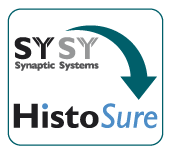|
|
|
|
| Cat. No. HS-466 003 |
50 µg specific antibody, lyophilized. Affinity purified with the immunogen. Albumin and azide were added for stabilization. For reconstitution add 50 µl H2O to get a 1mg/ml solution in PBS. Then aliquot and store at -20°C to -80°C until use. Antibodies should be stored at +4°C when still lyophilized. Do not freeze! |
| Applications | |
| Immunogen | Synthetic peptide corresponding to AA 291 to 309 from mouse Cd86 (UniProt Id: P42082) |
| Reactivity |
Reacts with: mouse (P42082). No signal: human (P42081), rat. Other species not tested yet. |
| Remarks |
IHC: Heat-mediated antigen retrieval (in citrate buffer pH 6) is required for immunohistochemical staining of PFA fixed tissues. Methanol fixation is required for immunohistochemical staining of fresh frozen tissues. |
| Data sheet | hs-466_003.pdf |
 Important information
Important information|
|
CD86 (Cluster of Differentiation 86, also known as B7.2) belongs to the B7 family of immune-regulatory cell-surface protein ligands (1). CD86 and the genetically closely linked CD80 protein (also known as B7.1) are expressed by antigen presenting cells and provide costimulatory signals necessary for T cell activation and tolerance via interaction with CD28 and cytotoxic T-lymphocyte antigen 4 (CTLA-4) expressed on T-cells. However, CD80 and CD86 have non-equivalent roles in immune modulation: CD86 is the dominant ligand for proliferation and survival of regulatory T cells (Tregs) (2) and shows in comparison with CD80 very high efficiency at increasing T cell killing capacity (3). CD86 is expressed only at low levels on resting B cells, dendritic cells and macrophages; activation results in enhanced CD86 expression (Collins et al., 2005). In the CNS, CD86 upregulation is a marker of activated pro-inflammatory M1 microglia (4). In oncology research, CD86 is a biomarker to phenotypically differentiate classically activated M1 macrophages from alternatively activated M2 macrophages in the tumor microenvironment (5).